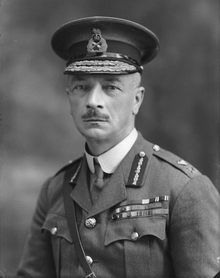Lovick Friend
Major General Sir Lovick Bransby Friend KBE, CB, PC (25 April 1856 – 19 November 1944) was a British Army major general and amateur sportsman. He served with the Royal Engineers and was Commander-in-Chief, Ireland during the 1916 Easter Rising. As a sportsman, Friend played in goal for the Royal Engineers in the 1878 FA Cup Final and first-class cricket for Kent County Cricket Club.
Lovick Friend | |
|---|---|
 | |
| Born | 25 April 1856 Sidcup, Kent, England |
| Died | 19 November 1944 (aged 88) |
| Allegiance | |
| Service/ | |
| Years of service | 1866–1921 |
| Rank | Major-General |
| Commands held | Ireland |
| Battles/wars | Mahdist War First World War Easter Rising |
| Awards | Knight Commander of the Order of the British Empire Companion of the Order of the Bath |
Early life
Friend was born at Halfway Street near Sidcup in Kent in 1856, the fourth son of a merchant. He grew up at the family home, Woollett Hall at North Cray, and was educated at Cheltenham College and the Royal Military Academy Woolwich.[1][2]
Military career
Friend won a prize for Artillery whilst at Woolwich and was commissioned into the Royal Engineers in 1874 as a Temporary Lieutenant.[1][3] His commission was made permanent in 1876 and he spent the stationed in Ireland and Hong Kong before being appointed as an instructor at the Royal Military Academy Sandhurst in 1883 and promoted to Captain in 1885.[1]
In 1885 he was made Secretary of the Royal Engineers Experimental Committee[3] and seen time serving in the British West Indies training the West Indies Fortress Company before being promoted to Major in 1893.[1] He was posted to Egypt in 1897 and served as a Staff officer in charge of organising supplies during the Anglo-Egyptian invasion of Sudan in 1898 before being attached to the Intelligence Department before the Battle of Omdurman where he was an aide to Sir Herbert Kitchener, the commander in chief of British forces.[1] He was mentioned in despatches after the battle and received the Khedive's Sudan Medal and Queen's Sudan Medal as well as the Order of Osmanieh, fourth class.[1]
He was Director of Works and Stores for the Egyptian Army from 1900 to 1904, during which he received the Order of Medjidie, third class.[4] He subsequently held a variety of roles both in Egypt and in Britain in the years before the First World War. Promotions continued and Friend rose to the rank of Major general in 1912.[1] He was appointed Major-General in charge of Administration at Irish Command in 1912 and Commander-in-Chief, Ireland in 1914.[1][3]
Friend was in command in Ireland when the Easter Rising broke out in 1916. In the lead up to the Rising he was in command during the capture of the arms ship Aud and the arrest of Roger Casement on 21 April, but went on leave to England after the arrest, apparently "satisfied that the danger had passed.[5] When the Rising began on 24 April, Friend returned to Dublin and he received the surrender of the rebel leaders but his decision to leave Ireland in advance of the Rising was seen as an error of judgement and he was replaced by Sir John Maxwell.[1]
From 1916 until his retirement in 1920 Friend was President of the Claims Commission of the British Armies in France.[1][2] He was awarded the Ordre de Léopold, Legion d'Honneur and Croix de Guerre for his role and in 1919 was made KBE and mentioned in despatches for a fourth time in his career, his organisational skills being praised by Haig.[1] He was placed on retirement pay in June 1920 after 47 years of military service, although he continued to serve as Chairman of the French Committee of the Disposal Board.[1]
Sporting career
Friend played cricket for Royal Military Academy Woolwich and then regularly for the Royal Engineers Cricket Club after he was commissioned in the mid-1870s.[6] He made 198 runs against a Band of Brothers side in 1885 which included Lord Harris, a key administrator and the captain of Kent County Cricket Club at the time. He made his first-class cricket debut the following season for Kent at Hove before playing twice more for Kent in 1887. He made single first-class appearances for Marylebone Cricket Club (MCC), I Zingari and the Gentlemen of England side between 1886 and 1891 and played non-first-class cricket for Northumberland as well as for a variety of other sides such as Free Foresters and United Services.[1][7][8]
Friend played football for Royal Engineers, including playing in goal for the team in the 1878 FA Cup Final.[9]
Later life
Friend spent time during his retirement in South Africa and Australia. He died in a nursing home in London on 19 November 1944 aged 88.[1]
References
- Lewis P (2013) For Kent and Country, pp.176–179. Brighton: Reveille Press.
- Warsop, Keith (2004). The Early F.A. Cup Finals and the Southern Amateurs. Tony Brown, Soccer Data. pp. 79–80. ISBN 1-899468-78-1.
- "Friend, Sir Lovick Bransby". Liddell Hart Centre for Military Archives. Archived from the original on 10 September 2009. Retrieved 10 November 2019.
- "No. 27476". The London Gazette. 23 September 1902. p. 6075.
- Lewis P Op. cit., p.177.
- Lovick Friend, CricketArchive. Retrieved 2017-10-22.
- Lovick Friend, CricInfo. Retrieved 2017-10-22.
- Friend, Major-General The Right Hon. Lovick Bransby, Obituaries in 1944, Wisden Cricketers' Almanack, 1945. Retrieved 2017-10-22.
- "Sporting Chronicle". Archived from the original on 29 August 2007. Retrieved 2 February 2008.
External links
| Military offices | ||
|---|---|---|
| Preceded by Arthur Paget |
Commander-in-Chief, Ireland 1914–1916 |
Succeeded by John Maxwell |